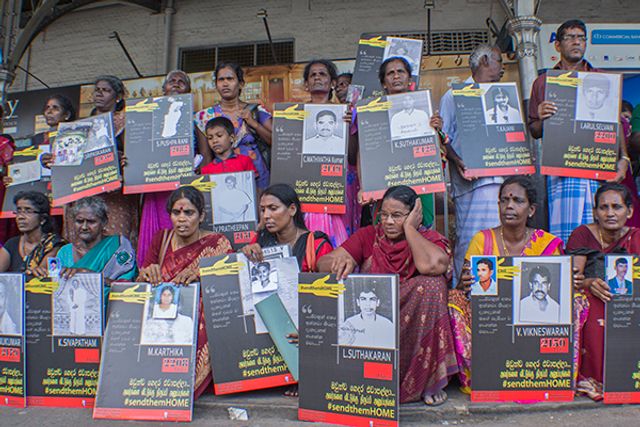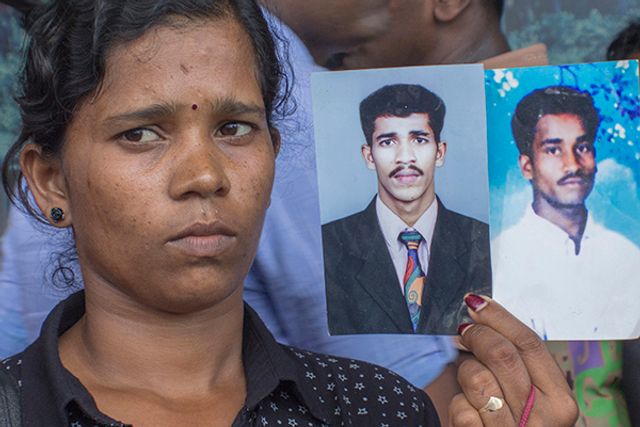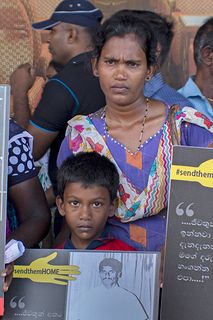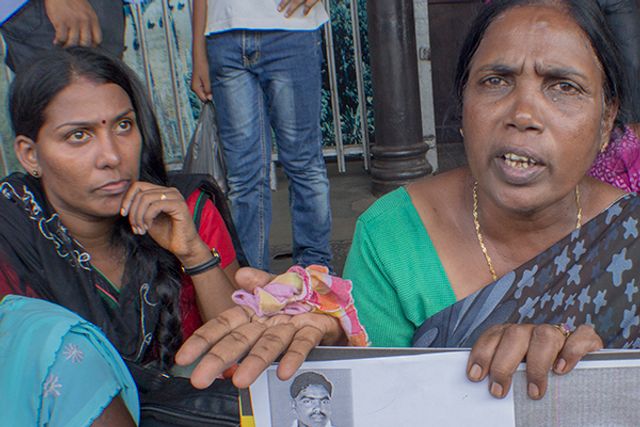by S. Jayantha, WSWS.org, April 13, 2015
Several dozen relatives of Tamils who were arrested or abducted during the communal war conducted by successive governments in the country’s north and east joined a picket in Colombo last Tuesday.
Most of the protesters were mothers and wives. Many travelled overnight from the northern Mannar district. Holding photographs of their missing loved ones, they demanded that the government release them. They suspect that their children and husbands are alive and detained in secret camps.

A section of the picket
Thousands of people are still missing, nearly six years after the decades-long war ended with the defeat of the separatist Liberation Tigers of Tamil Elam (LTTE) in 2009. After former President Mahinda Rajapakse renewed the war in 2006, thousands of Tamil youth were detained, tortured and often murdered by the military and associated paramilitary groups.
The UN estimated that more than 40,000 civilians were killed during the final months of the military’s onslaught. More than 10,000 young people were arrested as LTTE members and suspects at the end of the war. Some were dragged to detention centres from military-run refugee camps, where nearly 300,000 people were held behind barbed wire.
Though the government claimed to have released nearly all the “rehabilitated” LTTE suspects, thousands are still unaccounted for. In an attempt by Rajapakse to deflect the criticism of his regime’s war crimes, a Presidential Commission was established to find the “disappeared.” It has received about 15,000 complaints over the past two years, but only investigated 2,000 cases, and relatives have seen no progress.
Koneswary, a mother of five from Mannar told the World Socialist Web Site that her daughter Kirthika disappeared during the final days of the war, when she was 14. “After the war was restarted by President Rajapakse in 2006, we fled from Mannar to Kilinochchi to escape from the shells and air strikes. It was a long and horrible journey. Some people had to bury their dead relatives during the escape.
“Finally we were trapped in Putumattalan. During a shell attack there, we missed our daughter. Later an eyewitness told us that she was arrested by the army in a refugee camp.”
Lucia, who has searched for her husband and brother since 2008, said: “A group came in a white van, abducted my husband Roobakanthan in front of me in the Kidachoori refugee camp in Vavunia. My brother Mariyaseelan was abducted in the eastern town of Batticaloa when he visited a friend. I believe they are being detained in a camp or somewhere. We lamented and begged at the Presidential Commission for their release but there was no response.”

Charles Joseph lost his son in 2008. He said some neighbours saw him arrested by the army in a nearby town, but were afraid to give evidence.
Lucia
P. Muthukaruppan said the army arrested his two sons at Vattuwal during the war’s final phase. He believes that his elder son Antony, now 35, is alive. “I saw him in a recently published photograph,” he said. “Where ever there is picketing on this issue, we go. I don’t have any confidence that this government will solve the problems of Tamil people. However, we demand that they release our loved ones.”
A 15-year-old teenager said his father Anandarajah, 47, was abducted by the Navy at Pesalai in Mannar. “Both the previous and new government promised to find the disappeared persons, but did nothing,” he said.
 Rajeswari
RajeswariRajeswari, who came from Jaffna, told us that her husband disappeared in 2007 after he went to a military office to obtain a security clearance for a job overseas. She has faced enormous difficulties for the past eight years.
Kavitha’s 39-year-old husband disappeared in 2006 at Pallimunai in Mannar. “We were in a military-controlled area,” she said. “My husband went into the town but never returned. No words can explain the difficulties I face with two children.”
Kavitha’s aunt Udaya Chithra said her son was dragged from his bed in Pallimunai, Mannar in 2008 by plain-clothed soldiers, who promised to release him after an inquiry. She had seen a photograph of her son in Welikada prison. “Seven youth were in that photograph,” she said. “Their mothers are here. We believe they are alive.”
While the relatives are determined to find their loved ones and obtain justice, the picket organisers promoted illusions in this year’s election of Maithripala Sirisena. In a leaflet, the “Protest of the Street,” a collective of “112 civil groups,” boasted that they “determinedly took the initiative in the victory won on January 8, 2015.” In other words, they campaigned for Sirisena.
The leaflet also warned “communal forces” not to try to reverse this “victory” and issued a call for people to pressure the government to implement its program.
Kavitha and Udaya Chithra
Sirisena’s election win and the formation of a United National Party (UNP)-led government is no victory for the war victims or the working people as a whole. Sirisena was Rajapakse’s acting defence minister at the end of the war. He took office via a regime change operation instigated by Washington with the support of the UNP and former president Chandrika Kumaratunga.
of a United National Party (UNP)-led government is no victory for the war victims or the working people as a whole. Sirisena was Rajapakse’s acting defence minister at the end of the war. He took office via a regime change operation instigated by Washington with the support of the UNP and former president Chandrika Kumaratunga.
The US, which fully backed the anti-Tamil war, has no concern for democratic or human rights. It only opposed Rajapakse because he maintained close relations with China.
Neither Sirisena nor UNP leader Ranil Wickremesinghe will provide any justice to the war victims or their relatives. The UNP started the war in 1983 and backed Rajapakse’s recommencement of it. As prime minister, Wickremesinghe has publicly disputed the UN figures on civilian casualties, and insisted that the government will not remove military camps from the north and east.